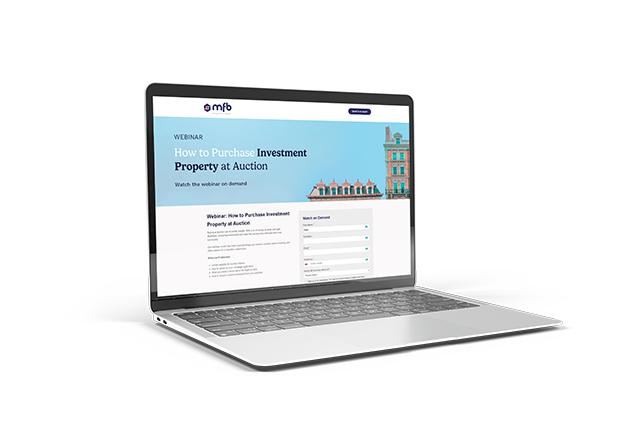Auction finance is relatively straightforward, but getting every step of the process right is key to success. Here, we explain how to prepare for an auction to ensure you bid confidently and secure the right property for your portfolio.
1. Define Your Strategy
Start by asking yourself: What am I trying to achieve? Are you looking for a short-term value-add opportunity or a long-term rental investment?
Short-Term Value-Add Strategy
If you're looking to buy, renovate, and sell quickly, you'll want to focus on properties with clear potential for improvement in locations with strong buyer demand and rising house prices.
Long-Term Rental Investment
If your goal is to grow your portfolio, you’ll need to focus on properties in prime locations for renters (e.g., commuter zones and locations with stable yields).
Being clear on your strategy helps you avoid distractions and pursue properties that align with your goals. It also helps you communicate clearly with brokers, solicitors, and auctioneers, making the entire process smoother.
2. Choose Your Area Wisely
Chasing higher rental yields in unfamiliar regions may be tempting, but local knowledge is often your greatest asset. Buying in an area you know well makes you more likely to understand market trends, pricing nuances, and buyer or tenant demand.
You’ll also have access to trusted local contacts, like tradespeople, estate agents, and surveyors, who can be invaluable if the property needs work or issues arise post-purchase. Knowing the area also helps you spot opportunities others might miss and make faster, more confident property investment decisions.
3. Browse Auction Catalogues
Once you’ve narrowed down your area, start exploring available properties listed for auction. Most auction houses publish their catalogues online, and you can also find auction properties on major property portals such as Rightmove.
Take your time to compare listings and shortlist those that align with your investment strategy. Look out for guide prices, property condition, and any notes about legal or structural issues.
4. Do Your Due Diligence
This step is absolutely essential. For any property you're considering, download the legal pack and have it reviewed by a solicitor. Surprisingly, around 40% of auction buyers skip this entirely, and you don’t want to be one of them!
The legal pack contains key documents such as:
- Title deeds
- Search results
- Special conditions of sale (which may include clawbacks, charges, or hidden costs)
Without reviewing these, you risk buying a property with unexpected legal or financial complications. Taking professional advice early can save you time, money, and stress later.
5. View the Property
Seeing the property in person is key. Try to visit at least twice before you bid, and if possible, bring along:
- A contractor who can assess renovation needs and costs
- A surveyor to flag any structural issues
Look out for anything that could affect your budget, timeline, or ability to secure finance. Even small issues can have a big impact, so don’t rely solely on photos or descriptions.
6. Plan Your Financing
You’ll typically need to complete within 28 days of the auction, which can be tight for standard mortgage lenders. That’s why it’s crucial to:
- Have your Decision in Principle (DIP) ready
- Work with a broker who understands auction timelines
- Choose lenders known for fast turnaround times
If the property isn’t mortgageable, perhaps due to its condition or missing certification, bridging finance can be a great solution. Bridging loans are short-term, interest-only loans designed to “bridge” the gap until you can refinance or sell. They’re:
- Quick to arrange, often within days
- Flexible, allowing you to buy un-mortgageable properties
- Ideal for refurbishment projects or chain-free purchases
However, bridging finance comes with higher interest rates and fees, so it’s important to factor those into your budget and have a clear exit strategy, whether refinancing with a buy to let mortgage or selling the property.
Ultimately, your finances should align with your strategy, the property type, and your timeline. Speak to your broker before you begin bidding, and ensure everyone understands the auction’s pace.
7. Set Your Maximum Bid
Know your ceiling and stick to it. It’s easy to get caught up in the moment, but even a small overbid can eat into your profit margin or stretch your finances.
For example, a £1,000 increase might be negligible on a £800,000 property in the South East, but it could represent a significant portion of your margin on a £30,000 property in the North East.
When setting your limit, be strict and realistic, and budget for renovation costs, fees, and your exit strategy.
8. Communicate and Prepare
If your bid is successful:
- Be ready to pay your 10% deposit immediately, usually by debit card
- A memorandum of sale will be issued to formalise the deal
- Completion typically follows within the agreed timeframe, with the balance paid to the vendor’s solicitor
Keep communication open with your solicitor and auctioneer throughout. Transparency can help avoid complications if any issues arise, such as delays in financing. Vendors are often willing to offer short extensions if they’re kept informed.
As mentioned earlier, be clear on your exit strategy from the outset. Whether you plan to refinance with a buy to let mortgage, sell the property after renovation, or hold it as a long-term rental, having a defined plan will help guide your decisions and ensure your financing aligns with your goals.
Discuss your auction plans
If you’re preparing to buy at auction, speak to our team of experts! With whole-of-market access, we can help you arrange the bridging finance in advance so you can bid with confidence.
Call our auction finance experts on 0345 345 6788 or submit an enquiry here.
